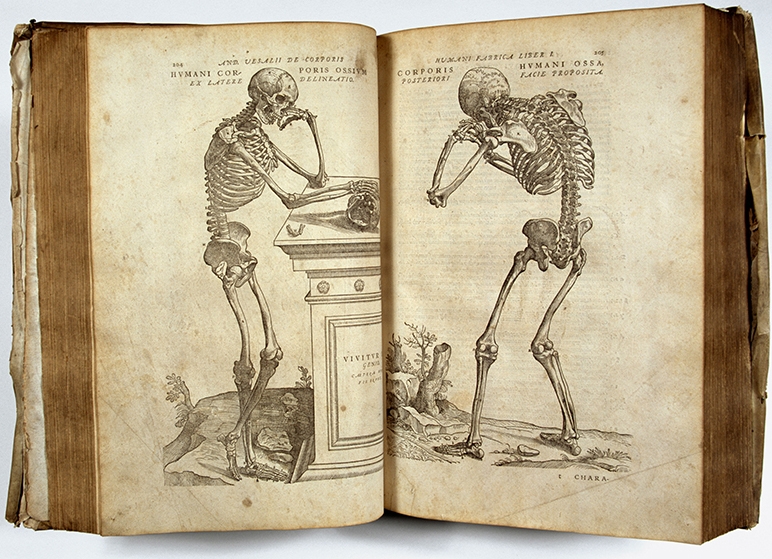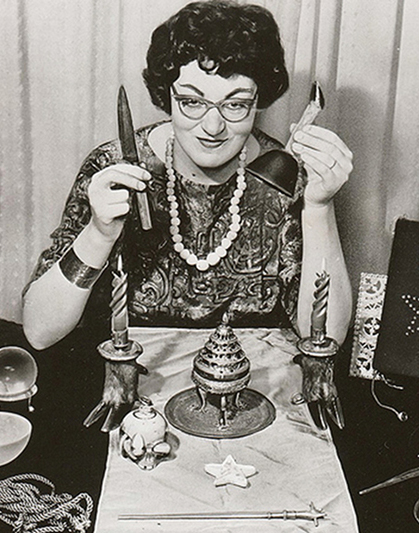Spring 2020 Honors College Retro Readings to Explore Secret Rituals and the Logistics of Science

Science Works: Pages from "De Corporis Humani Fabrica," by Andreas Vesalius (1514-1564), a series of pioneering human anatomy books from the library archives of Exeter Cathedral.
In Honors College Retro Readings courses, students from all colleges tackle classic texts from a contemporary, multidisciplinary point of view. Next spring students will witness an expansion of topics, with courses offered on beliefs in hidden knowledge and the logistics of science. Previous topics include the works of J.R.R. Tolkien, Darwin and J.K. Rowling's Harry Potter series.
These 75-minute, one-credit-hour honors courses pair students with expert faculty to provide them with a "Great Books" experience, one of the hallmarks of a liberal arts education.
"These short courses allow students from all disciplines to really dig deep and evaluate the world around them," said Lynda Coon, dean of the Honors College and professor for Bible, a recent Retro Readings course. "We couldn't be more excited about the partnerships these courses afford us with departments across campus."
Honors students must apply to participate in Retro Readings courses, and seats are typically capped at 12 per class. Interested students are encouraged to read more about the courses and professors on the Retro Readings web page.
The final deadline to apply is 11:59 p.m. Friday, Nov. 1.
The spring 2019 Retro Readings are:
 Doreen Valiente: Secrets will include readings by Doreen Valiente (1922-1999), one of the early feminist leaders and a high priestess of British Wicca, who helped make Wiccan practices safe for women. |
Secrets: Honors College Director of Development John Treat, who holds a doctorate in history and whose research focuses on 19th-century secret societies and their impacts on concepts of race and citizenship, will engage students through a variety of primary texts to examine the rise and development of Western esotericism from its early modern antecedents to the 20th-century rise of Neopaganism. Belief in hidden knowledge, initiations and ritual magic has been persistent through Europe and North America's industrial and scientific revolutions. The course will investigate the lasting appeal of esoteric practices such as tarot cards, witchcraft and Freemasonry in an increasingly scientific and secular culture. Overall, students will test Wouter Hanegraaff's claim that Western esotericism is best understood as the discarded knowledge of earlier eras.
How Science Works: In this course, Parks Family Professor of Science Education William F. McComas and his students will evaluate how science produces and validates knowledge. Students will read what is regarded as the most important book in the field, Thomas Kuhn's The Structure of Scientific Revolutions (1962). Kuhn's work has influenced scholarship and popularized terms such as paradigm but has also been misinterpreted, rejected and even denied by many. Students will have the opportunity to evaluate and explore Kuhn's vision of science for themselves. The semester will then conclude with the contemporary account of scientific discovery, Your Inner Fish, by Neil Shubin (2008). Shubin's work will enable students to envision what modern scientists actually do and how much "truth" there in this thing called science.
About the Honors College:The University of Arkansas Honors College was established in 2002 and unites the university's top undergraduate students and professors in a learning environment characterized by discovery, creativity and service. Each year the Honors College awards up to 90 freshman fellowships that provide $72,000 over four years, and more than $1 million in undergraduate research and study abroad grants. The Honors College is nationally recognized for the high caliber of students it admits and graduates. Honors students enjoy small, in-depth classes, and programs are offered in all disciplines, tailored to students' academic interests, with interdisciplinary collaborations encouraged. Fifty percent of Honors College graduates have studied abroad and 100 percent of them have engaged in mentored research.
Topics
Contacts
Darci Walton, dean's intern
Honors College
479-575-7678,
dewalton@email.uark.edu
Kendall Curlee, director of communications
Honors College
479-575-2024,
kcurlee@uark.edu
Headlines
Four Students Named Goldwater Scholars; Two Earn Udall Honorable Mentions
Four U of A students have received the prestigious Goldwater Scholarship, an award for top students in mathematics, science, and engineering.
Cross-Campus Collaboration Culminates in New Outdoor Geological Installation
Grand opening event to celebrate the new GeoLab installation at the U of A’s Gearhart Hall courtyard is set for May 3. The installation will be open to the public year-round.
First Students to Use Online Degree to Hone Nursing Leadership, Elevate Patient Care
Hanna Baxendale and Wendi Kimbrell will begin coursework in the Doctor of Nursing Practice-Executive Master of Business Administration program offered by the Eleanor Mann School of Nursing and Walton College.
Join the Office for Sustainability on a Final Cruise to Campus
Cruise to Campus Wednesdays have fostered a gathering space for individuals interested in biking to campus. Drop by the Old Main Lawn from 7:30-10 a.m. Wednesday for coffee, something to eat and conversation.
Fay Jones School Student Ambassador Program Gives Voice to Design Students
The student ambassador program at the Fay Jones School of Architecture and Design is built to connect top design students with their school, its alumni, its future students and others inside and outside the school.




